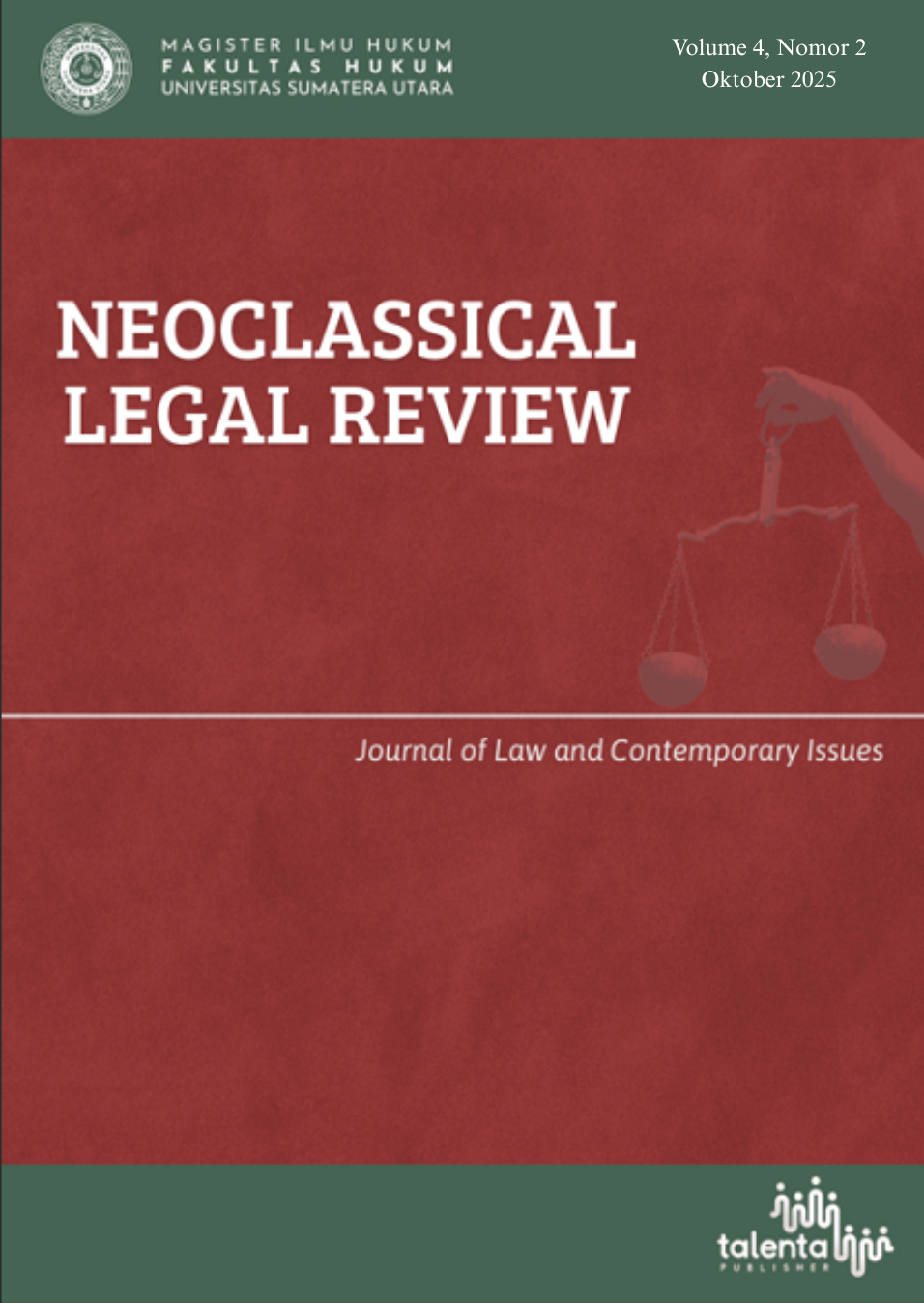Adaptive Criminal Liability for Persons with Disabilities: A Review of Criminal Reduction and Elimination Policies in the National Criminal Code
PertanggungJawaban Pidana yang Adaptif dalam Reformasi Hukum Nasional: Mengakomodasi Gangguan Mental dalam Hukum Pidana
DOI:
https://doi.org/10.32734/nlrjolci.v4i2.20658Keywords:
Mental Disability, Criminal Liability, New Criminal CodeAbstract
The reformulation of criminal liability in the New Criminal Code through Articles 38 and 39 demonstrates the commitment of the Indonesian criminal law system to accommodate the principle of inclusive justice for persons with mental and/or intellectual disabilities. This article discusses the elimination and reduction of punishment for perpetrators with disabilities from a normative perspective, as well as the challenges of its implementation at the practical level. In the old Criminal Code, Article 44 only provides general criminal exemptions without procedural clarity and alternative measures. The 2023 Criminal Code, which will enter into force in 2026, changes this approach by distinguishing between offenders who are still able to understand the consequences of their actions (subject to punishment with reduction or alternative measures) and offenders who are in an acute state and unable to understand (subject to measures without punishment). This article uses a normative juridical approach and is supported by limited empirical juridical analysis to examine the effectiveness and challenges of this new provision. The results of the study show that Articles 38 and 39 have shifted the paradigm of punishment from retributive to humanistic, but their implementation still faces obstacles, especially regarding technical guidelines for assessing mental capacity, expert involvement, and potential treatment disparities. Therefore, a lex specialis is needed to support the general provisions so that they can be operationalized effectively, fairly, and non-discriminatively against persons with disabilities in the criminal law process.
Downloads
References
Bawazir, F. (2025). Pertanggungjawaban Pidana Pelaku Penderita Skizofrenia dalam Perspektif Hukum Pidana di Indonesia [Master Thesis, Universitas Jambi]. https://repository.unja.ac.id/76406/
Candra, S. (2013). Pembaharuan Hukum Pidana: Konsep Pertanggungjawaban Pidana dalam Hukum Pidana Nasional yang Akan Datang. Jurnal Cita Hukum, 1(1), 327–337. https://doi.org/10.15408/jch.v1i1.2979
Convention on the Rights of Persons with Disabilities (2006). https://www.ohchr.org/en/instruments-mechanisms/instruments/convention-rights-persons-disabilities
Hidayat, F. A. M., & Ibrahim, A. L. (2023). Disharmoni Pertanggungjawaban Pidana Disabilitas Mental Dalam Hukum Positif Di Indonesia. Justisi, 9(3), 326–343. https://doi.org/10.33506/jurnaljustisi.v9i3.2474
ICJR. (2015). Masalah Pertanggungjawaban Pidana Disabilitas Dalam R KUHP Harus Jadi Perhatian , DPR Harus Mengundang Ahli Khusus [Official Website]. Institute for Criminal Justice Reform. https://icjr.or.id/masalah-pertanggungjawaban-pidana-disabilitas-dalam-r-kuhp-harus-jadi-perhatian-dpr-harus-mengundang-ahli-khusus/
Johnston, E. L., Runyan, K. D., Silva, F. J., & Fuentes, F. M. (2023). Diminished Criminal Responsibility: A Multinational Comparative Review. International Journal of Law and Psychiatry, 91(101919), 45–47. https://doi.org/10.1016/j.ijlp.2023.101919
Pramesti, N. P. D. I., & Darmadi, A. A. N. O. Y. (2022). Pertanggungjawaban Pidana bagi Pelaku Penyandang Disabilitas dalam Kasus Pembunuhan Berencana. Kertha Wicara: Journal Ilmu Hukum, 11(11), 1794–1802. https://doi.org/10.24843/KW.2022.v11.i11.p6.
Putri, D., & Mardijono, H. R. A. (2024). Perkembangan Hukum Penyandang Autisme di Indonesia. 4(1), 781–788.
Raharjo, T., & Astuti, L. (2018). Konsep Diversi Terhadap Anak Penyandang Disabilitas Sebagai Pelaku Tindak Pidana Dalam Sistem Peradilan Pidana Anak. Jurnal Media Hukum, 24(2), 181–192. https://doi.org/10.18196/jmh.2017.0094.181-192
Rahayu, L. (2024). Pemidanaan terhadap Pelaku Berkebutuhan Khusus (Disabilitas) dalam Proses Pidana Saat Ini. Rechtsidee, 12(2), 1–14. https://doi.org/10.21070/jihr.v12i2.1030
Rahmasari, F. (2024). Perlindungan Hukum Bagi Penyandang Disabilitas Mental dalam Lingkungan Kerja Sebagai Upaya Pencegahan Pemutusan Hubungan Kerja [Undergraduate Thesis, Universitas Islam Indonesia]. https://dspace.uii.ac.id/handle/123456789/49390
Remaja, I. N. G. (2019). Rancangan KUHP Nasional sebagai Rancangan Pembaharuan Hukum Pidana yang Perlu Dikritisi. Kertha Widya: Jurnal Fakultas Hukum UNIPAS, 7(2), 1–19. https://doi.org/10.37637/kw.v7i2.514
Silitonga, T., Purba, Y., Munthe, H., & Herlina, E. S. (2023). Karakteristik Anak Berkebutuhan Khusus. Jurnal Pendidikan Sosial Dan Humaniora, 2(3), 11155–11179.
Sudharma, K. J. A., & Meiranda, A. (2021). Pemidanaan Terhadap Penyandang Disabilitas Mental sebagai Pelaku Tindak Pidana Pencabulan (Studi Putusan Perkara Nomor 16/Pid.Sus/2019/Pn.Wsb). Jurnal Hukum Saraswati, 3(2), 56–71. https://doi.org/10.36733/jhshs.v3i2.2957
UGM, F. P. (2019). Indonesia Kekurangan Tenaga Psikologi Forensik [Official Release]. Universitas Gadjah Mada Fakultas Psikologi. https://psikologi.ugm.ac.id/indonesia-kekurangan-tenaga-psikologi-forensik/
Undang-Undang Dasar Negara Republik Indonesia Tahun 1945 (1945).
Downloads
Published
How to Cite
Issue
Section
License
Copyright (c) 2025 M. Ghufron Fazacholil, Yusuf Saefudin

This work is licensed under a Creative Commons Attribution-ShareAlike 4.0 International License.










